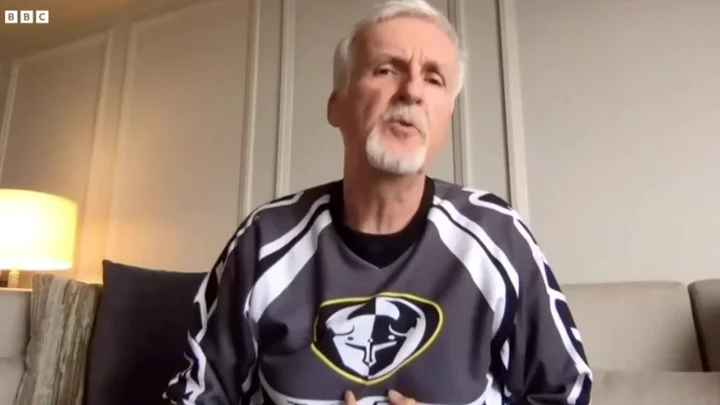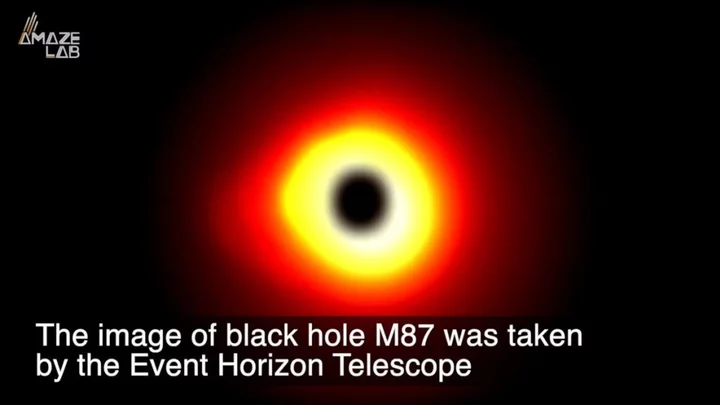
Inside Titanic director James Cameron's obsession with the deep ocean
Public interest in the deep ocean went into a frenzy this week as the search for the doomed Titan submarine played out – and Oscar-winning film director has made no secret of the fact that he is obsessed with the subject. Since it emerged on 22 June that the Titan was destroyed in what US authorities called a “catastrophic implosion”, Cameron has been telling media outlets that he knew what the five-man crew’s fate was since Monday, four days earlier. After calling up his “contacts in the deep submersible community” Cameron said he had already ascertained that the vessel had been destroyed in an implosion. “I felt in my bones what had happened.” Sign up to our free Indy100 weekly newsletter But why does Cameron know so much about the ocean depths? Titanic, Avatar and The Abyss First of all, Cameron has made a lot of films about the bottom of the sea. His 1997 film, Titanic, won 11 Oscars and was the first movie to earn more than $1bn worldwide, and Cameron went deep on his research – literally. The filmmaker has visited the real-life wreck of the Titanic 33 times, making his first trip in 1995 to shoot footage for the film. One of those dives even involved getting trapped with the wreck for 16 hours, with currents of water holding the director’s submarine at the bottom of the ocean. He has even written a book about his experiences, Exploring The Deep, which includes details of his dive journey, photos and maps from his own explorations of the wreck. He told ABC News: “I actually calculated [that] I've spent more time on the ship than the captain did back in the day.” Long before Titanic, Cameron directed The Abyss in 1989. The premise of the film is that an American submarine sinks in the Caribbean – sound familiar? That prompts a search and recovery team to race against Soviet vessels to recover the boat. Meanwhile, the last movie in Cameron’s famous Avatar franchise, The Way of Water, is set on the aquatic ecosystems of a world 25 trillion miles from Earth. "Some people think of me as a Hollywood guy … (but) I make 'Avatar' to make money to do explorations," Cameron told The Telegraph. Going even deeper In 2012, Cameron went a step further, plunging nearly 11km down to the deepest place in the ocean, the Mariana Trench in the western Pacific. The filmmaker made the solo descent in a submarine called the Deepsea Challenger, and it took more than two hours to reach the bottom. The submarine he used was years in the making, designed by Cameron himself with a team of engineers. The trip was only the second manned expedition to the Mariana Trench. The first was in 1960, when US Navy Lieutenant Don Walsh and Swiss scientist Jacques Piccard descended to the ocean floor. “It was absolutely the most remote, isolated place on the planet,” Cameron said in a later interview. “I really feel like in one day I've been to another planet and come back.” He was even underwater when 9/11 happened His obsession with the ocean goes back to age 17, he told the New York Times, when he learned to scuba dive, when he said he felt like he had discovered the "keys to another world”. And between making Titanic in 1997 and Avatar in 2009 Cameron didn’t make a feature film. But he did make documentaries about sea exploration. One of those, 2003’s Ghosts of the Abyss, showed Cameron's travels to the Titanic, while the other, 2005’s Aliens of the Deep, saw Cameron team up with NASA scientists to explore the sea creatures of mid-ocean ridges. Cameron’s fascination even meant he was inside a submersible vessel exploring the Titanic on 11 September 2001, when terrorists flew two passenger jets into the World Trade Centre. It was only after the now-68-year-old director and his crew finished their expedition and returned to the main ship that Cameron learned what had happened. “What is this thing that’s going on?” Cameron asked the late actor Bill Paxton, who played treasure hunter Brock Lovett in the film. “The worst terrorist attack in history, Jim,” Paxton said. Cameron realised he “was presumably the last man in the Western Hemisphere to learn about what had happened,” he told Spiegel in 2012. Have your say in our news democracy. Click the upvote icon at the top of the page to help raise this article through the indy100 rankings.
2023-06-23 20:27

Ontario Fund Near Deal to Invest in Toronto’s NBA, NHL Teams
Ontario Municipal Employees Retirement System is nearing a deal to buy 20% of a holding company that owns
2023-06-23 19:59

Scientists discover centuries old 'echo' from supermassive black hole
The universe appears to be speaking to us, after a centuries old “echo” from a supermassive black hole was detected by scientists. The black hole located inside the Milky Way became active around 200 years ago and produced a sound that is now being studied. The research was published in Nature and focuses on the black hole named Sagittarius A* (Sgr A*) found 26,000 light-years away from Earth. The noise was triggered when the object consumed gas and dust, with particles moving into the event horizon. The findings could teach us more about the activity of supermassive black holes, which continue to intrigue and confound scientists. Sign up to our free Indy100 weekly newsletter Author of the research Dr Frederic Marin of Strasbourg University said: “It reveals the past awakening of this gigantic object – which is four million times more massive than the Sun. “Our work presents the missing piece of evidence that X-rays from the giant molecular clouds are due to reflection of an intense, yet short-lived flare produced at or nearby Sagittarius A*. These results can further constrain the past activity of the galactic centre.” By their very nature, black holes are difficult to study as they absorb light around them, and these new findings offer insight into a fascinating part of space. Dr Marin said: “To get an idea of the increase in intensity of the X-ray emission when the black hole emerged from its quiescent state, it is as if a single glow-worm hidden in a forest suddenly became as bright as the Sun. “These findings explain why galactic molecular clouds near Sgr A* are shining more brightly than usual. It is because they are reflecting the X-rays emitted by Sgr A* 200 years ago.” Have your say in our news democracy. Click the upvote icon at the top of the page to help raise this article through the indy100 rankings.
2023-06-23 19:28

Braves vs. Reds prediction and odds for Friday, June 23
The 40-35 Cincinnati Reds just keep on winning. Cincinnati has won 11 straight games in a stretch that includes three series sweeps.The Reds now face its toughest test with a matchup against the Atlanta Braves. The best team in the NL is in town for a three-game weekend set, so let’s get i...
2023-06-23 19:20

Bernardo Silva offered monster contract to join Saudi Pro League
Bernardo Silva has been offered a huge contract to join the mass exodus of players heading to the Saudi Pro League. The 28-year-old would prefer to stay in Europe at this stage, though, leaving Paris Saint-Germain leading the race ahead of Barcelona.
2023-06-23 17:59

Threatening letters containing suspicious substances sent to Tennessee Republican lawmakers under FBI investigation
Republican state lawmakers in Tennessee received threatening letters containing a suspicious substance Thursday, prompting an investigation by the FBI, officials said.
2023-06-23 11:30

Joe Biden and Narendra Modi hail 'defining' US-India partnership
Narendra Modi addresses the US congress, attends a state dinner and receives a 21-gun salute.
2023-06-23 11:22

Malaysia to take legal action against Meta, says harmful content not removed
KUALA LUMPUR (Reuters) -Malaysian authorities said on Friday they will take legal action against Facebook parent company Meta Platforms for
2023-06-23 10:49

Cathay Pacific expects profit in first half of 2023
Cathay Pacific Airways on Friday said it expected to report a consolidated profit for the first half of
2023-06-23 08:55

Moderna seeks US FDA authorization for updated COVID vaccine
(Reuters) -Moderna said on Thursday it has completed a submission to the U.S. Food and Drug Administration seeking authorization for
2023-06-23 06:29

Top TikTok exec and public face of company in US is stepping down
TikTok's chief operating officer Vanessa Pappas is leaving the company, according to an internal memo obtained by CNN, after spending several tumultuous years as its top public advocate and a champion of TikTok creators in the face of accusations the platform poses a national security risk.
2023-06-23 06:20

Plaintiffs lawyers in Facebook data privacy case seek $181 million in fees
By Sara Merken (Reuters) -Plaintiffs' lawyers have asked a San Francisco federal judge to award more than $181 million in
2023-06-23 01:54
